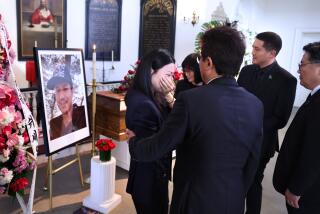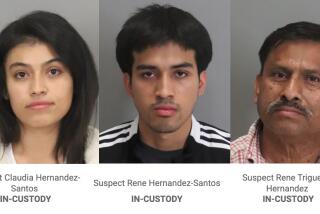Verdict in Exorcism Death Expected Today
- Share via
MALIBU — In the end, whether they called it a Korean ansukido or an old-fashioned Christian exorcism, there was little disagreement among the lawyers that the hours-long ritual to chase the demons from Kyung-Ja Chung resulted in her death.
Instead, as the three-week trial drew to a close Tuesday, the prosecutor and the defense attorneys remain literally worlds apart on whether the July 4 death of the Korean missionary’s 53-year-old wife was murder, manslaughter or a legally excusable accident.
The decision in the unprecedented murder case rests with Superior Court Judge James A. Albrecht, who said he expects to announce his verdict this morning.
For the defendants, Korean charismatic Christian missionaries, the judge’s decision will determine whether they win instant freedom or receive state prison sentences that could range from a few years to life.
The dead woman’s husband, Jae-Whoa Chung, 50, and exorcist Sung Soo Choi, 47, have been jailed since their arrests July 4. The trial has been closely followed by the Korean-American religious community.
Choi’s sponsoring church, Glendale Calvary Presbyterian Church, along with other Southern California Korean Presbyterian church groups have denounced the practice as heretical.
During the daylong closing arguments, Deputy Dist. Atty. Hank Goldberg brandished gruesome autopsy photos and startled spectators as he stomped loudly on the courtroom floor to demonstrate the force with which he alleges the defendants tried to drive out the demons.
“Look at what we’re dealing with in this case. Look at what they did to Mrs. Chung,” Goldberg exhorted, displaying photographs that show a woman he said was “brutalized.”
According to medical testimony, 16 ribs were broken, the muscles in her thighs were so damaged the tissue had died, her internal organs were displaced and crushed, and a vein leading to her heart was torn.
The defense attorneys quoted the Bible, Shakespeare and a smattering of high court decisions, attempting to sway the judge to their view--that their clients were men of God who, along with the dead woman, fervently and sincerely believed they were waging a life-and-death battle with a powerful demon named Legion.
“What we have here is a classic, passionate struggle between good and evil,” attorney James Barnes said. “They believed the demon was endangering her life and lying and threatening to kill her.”
The defendants resorted to ansukido, a ritual that combined Korean folk traditions for ridding people of spirits with the charismatic Christian practice of laying on of hands.
Robert Sheahen, another defense attorney, pointed to the words of the men involved in the ritual, including the prosecution’s chief witness, Glendale church deacon Jin Hyun Choi, who testified under a plea bargain in which he will serve no more than four years for involuntary manslaughter.
The missionaries said they never thought of her dying, Sheahen said. They were surprised that so many ribs had broken. Exorcist Choi, they observed, seemed “heartbroken.”
“This is the kind of case that all of us went to law school for,” Sheahen added. “This is the kind of case that’s important because it’s so novel. The court’s decision in this case will have far-reaching impact.”
Judge Albracht himself has observed that there seems to be little case law on the books to guide him.
Goldberg is seeking a second-degree murder conviction, and if he succeeds it would be the first in a demonic-possession case. He believes the laws that apply to murder and a defendant’s state of mind govern this case as well.
By continually pressing and stomping on a 53-year-old woman, Goldberg argued, the men showed a conscious disregard for her life--no matter whether their intent was to heal or to harm.
The exorcist even advised the husband that to cure her, they’d have to subject her to suffering comparable to journeying through hell.
“These people apparently went to the General Westmoreland school of demon-chasing,” Goldberg said. “They concluded that they needed to destroy the village to save it.”
The men received ample notice that their actions were endangering the woman, he argued. The first warning came when an acupuncturist scolded them, saying that there was a limit to what Kyung-Ja Chung could endure, and angrily ordered them out of her house in Koreatown. The second came when a young man who drove them to Century City asked if the woman was well.
The final, most dramatic warning came, Goldberg said, “from the devil himself,” who warned that he would not leave without killing Chung.
And yet, Goldberg said, the men assumed the risk and continued with even more vigor. By doing so, he argued, they committed second-degree murder.
The Chungs were Korean missionaries based in Bangladesh. Choi was based in China. All had traveled to Los Angeles to report on their work to some of their sponsoring churches.
More to Read
Sign up for Essential California
The most important California stories and recommendations in your inbox every morning.
You may occasionally receive promotional content from the Los Angeles Times.












